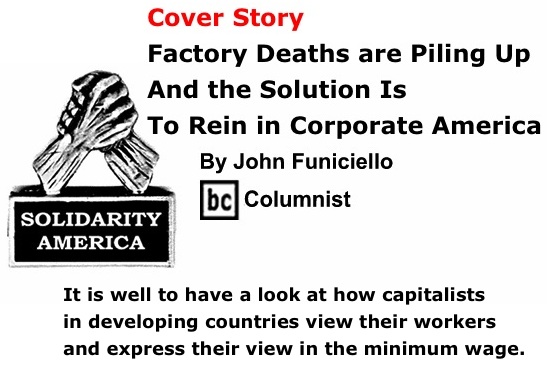




It’s tough enough to make American workplaces safe and healthy, despite that some laws have been passed over the past 50 years to make them so, but there is no control over how Corporate America functions in the factories in developing countries.
A case in point is the deaths of 1,100 garment
workers in a Bangladeshi factory, in a building that some in that
country have speculated was built out of the oversight of local or
regional government authorities whose job it is to see that the
buildings will not fall down and kill people by the hundreds.
There has been a series of such workplace disasters in developing
countries over the past several years, the worst just in the last few
months in Rana Plaza, just outside Dhaka, Bangladesh, on April 24. How
is that possible? It is well to have a look at how capitalists in
developing countries view their workers and express their view in the
minimum wage. Although Bangladesh is the second-largest producer of
garments in the world, it has the lowest wage, about $38 a month. Even
in Bangladesh, that is not even a subsistence wage. The per capita
income of the country in 2010 was $1,700 (U.S.), so the minimum wage in
the garment industry is a little more than one-quarter of the per
capita income.
When cracks appeared in the building, workers reportedly were told to go to work in the eight-story structure or face firing. Most of them went to work. Workers have demanded the death penalty for the building’s owner, Mohammad Sohel Rana, his father and other individuals who were engineers on the building project. The charges involve death by negligence, according to BBC News reports. Many have said the deaths rose to the level of murder, far beyond negligence or negligent homicide.
Few of the corporate types involved in the long chain of the textile industry from Bangladeshi clothing factories, to the retail mall stores of the U.S. and Great Britain, want to hear any association of the collapse with the word “murder.” It has been the contention for a long time that the giant retailers of America bore the ultimate responsibility for the deplorable working conditions in the poor countries where their goods were made. It has taken nearly three decades for that knowledge to seep through the American body politic.
Campaigns started in the early 1980s to bring awareness of the conditions and the starvation wages came from a variety of sources: unions, student groups, religious organizations, and others. It was a slow process. Getting the word out most often takes some money, even to hire part-time staff for a non-profit group that is trying to help those who are suffering every kind of deprivation to make clothing, shoes, and other goods for the citizens of the rich countries. These groups have no money and Corporate America has an endless supply of money and it has the communications industry behind it.
It is some 30 years on and people are beginning to wake up and, despite themselves, they are beginning to see the human cost of their (relatively) low-cost goods. If it weren’t for the students and the religious groups, that knowledge might not be as clear as it is today. The sacrifice of more than 1,100 workers brings the issue into sharper focus and the chain of responsibility really cannot be denied. Some big companies have been quick to say that they will sign an international agreement that is expected to make a big difference in the lives of Bangladeshi workers. The agreement would be binding and included in the first few days such companies as H&M (a Swedish firm), Primark of the U.K., and C&A of the Netherlands. It would include inspections for safety of the buildings and the work process and, presumably, would include the health and welfare of the workers.
Right after the collapse of the Rana building, officials indicated that the minimum wage might be raised, possibly to near double what it is now. What is interesting about that is that doubling the minimum wage would bring it to just above the minimum level that is said to be required for workers to live decently; that is, $64 a month. Why did it take the deaths of more than 1,100 workers, most of them women, to raise the minimum wage?
The next question is: What about the other dozen or more low-wage countries where the workers are treated as badly as in Bangladesh? And, what about their wages? The customers of the corporations that retail the goods have to take responsibility. They need to demand that their country’s corporations stop acting like the plunderers they have been around the world. “Out of sight, out of mind” has been the basic philosophy of operation of their enterprises in Bangladesh and elsewhere. They have acted with impunity, because their U.S. customers had no idea how their goods were being produced. Now, however, they are learning…slowly, but they are learning.
It will take too long for the American people to reach a critical mass, to demand that corporations do the right thing. Something stronger is needed. Recall that, back in 1998, Michael Jordan reportedly received $45 million from Nike for endorsing the brand’s “Air Jordan” basketball shoes. That amount, it was reported at the time, was more than all of the workers in a Nike factory in Indonesia made in a year. When he was confronted with that fact, Jordan replied that he did not want to get involved in the politics or economics of the trade, but that he would trust that Nike would, in the end, “do the right thing.”
Short of that critical mass of American customers, perhaps it is time to introduce legislation that will rectify the crimes of Corporate America. If it takes a law to force the transnational corporations to treat their workers right in other countries, then such a law should be introduced and adopted. A cynic might say that Corporate America has virtually ignored the laws in the U.S. that protect workers’ health and safety. And, they have driven the average wage down and fought every effort to raise the minimum wage. And, they have conducted an all-out war against workers and unions, so that American workers cannot even represent themselves in the workplace, so how can we expect them to treat foreign workers any better?
Even considering all of that, it is time for politicians to prohibit corporations from going into other countries with a depraved indifference to the human destruction they cause. In so many ways, it is war by another name. They leave pain and suffering and poverty with all its ills in their wake. Is there a politician courageous enough to draw up such a bill? It is true that corporations do not go into poorer countries with guns blazing; they don’t have to, because it’s all done with the legalisms of contracts with the elites of the countries and it’s all done with the backing of the “free trade” agreements negotiated by the governments, above and beyond the power of the people to protect themselves, their communities, their cultures, and their countries.
Long ago, Woody Guthrie, the legendary American folk singer and union organizer and advocate, said it in a lyric: “Some rob you with a six gun, and some with a fountain pen.” Corporate America and its counterparts in the other rich countries need no six guns or other armaments. They just need “free trade” agreements (that could be backed up with arms, if needed), and they need to be free of morals and common decency. After all, their company officials always say, “We don’t have any control over the hiring or wage policies or working conditions in other countries. We just contract with local companies. Our hands are clean.”
Although it is rare that American companies in their own country suffer any consequences for ignoring the health and safety of the workers and the nearby communities, there are still laws on the books that are supposed to address such willful negligence. Few CEOs ever go to jail for their crimes, because there is always “plausible deniability,” just as in the case of the big name brand clothing that was being produced in Dhaka, where the building fell onto 1,100 workers.
If there is ever such a law addressing the behavior of American corporations in other countries, it must be simple, stating that the companies shall adhere to all of the same standards that would apply on American ground. This should be a concern of all of the people, since the vast majority of Americans are workers and no one can expect corporations or the government to do anything, until they are forced to do so by continuing pressure from the people. Corporations for many decades have gone into other countries as representatives of the U.S., whether that is their intention or not, and they have behaved badly. And always, there has been the subtle threat (sometimes not so subtle) of the use of force of one kind or another.
President George W. Bush, after the attacks of 9/11, apparently trying to understand why anyone would perpetrate such a spectacular attack, said, “They hate us for our freedom.” Then and now, he could be assured that they most certainly do not hate us for our freedom.

BlackCommentator.com Columnist, John Funiciello,
is a long-time former newspaper reporter and labor organizer, who lives
in the
 |






